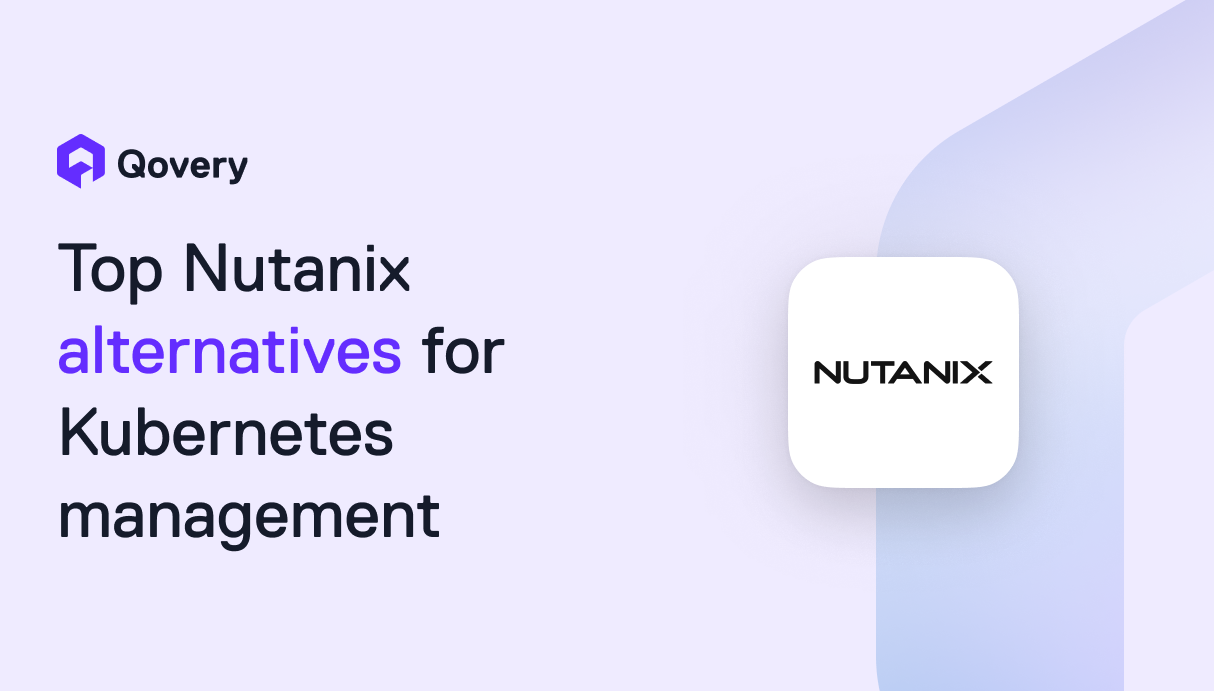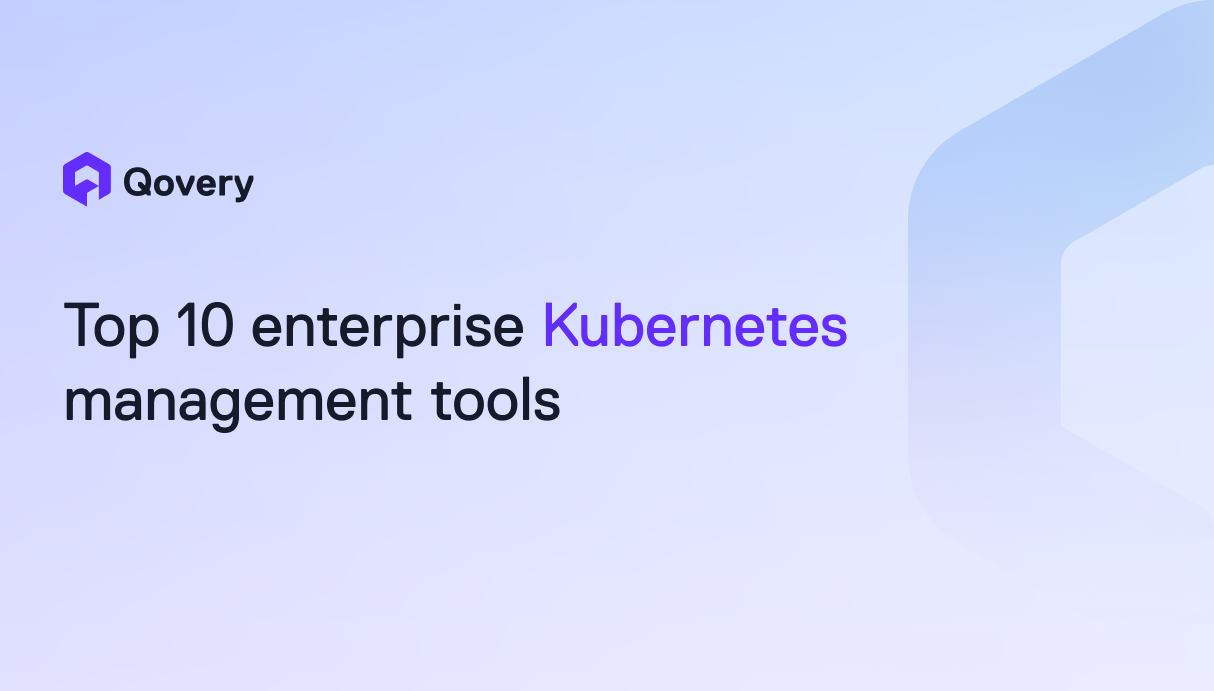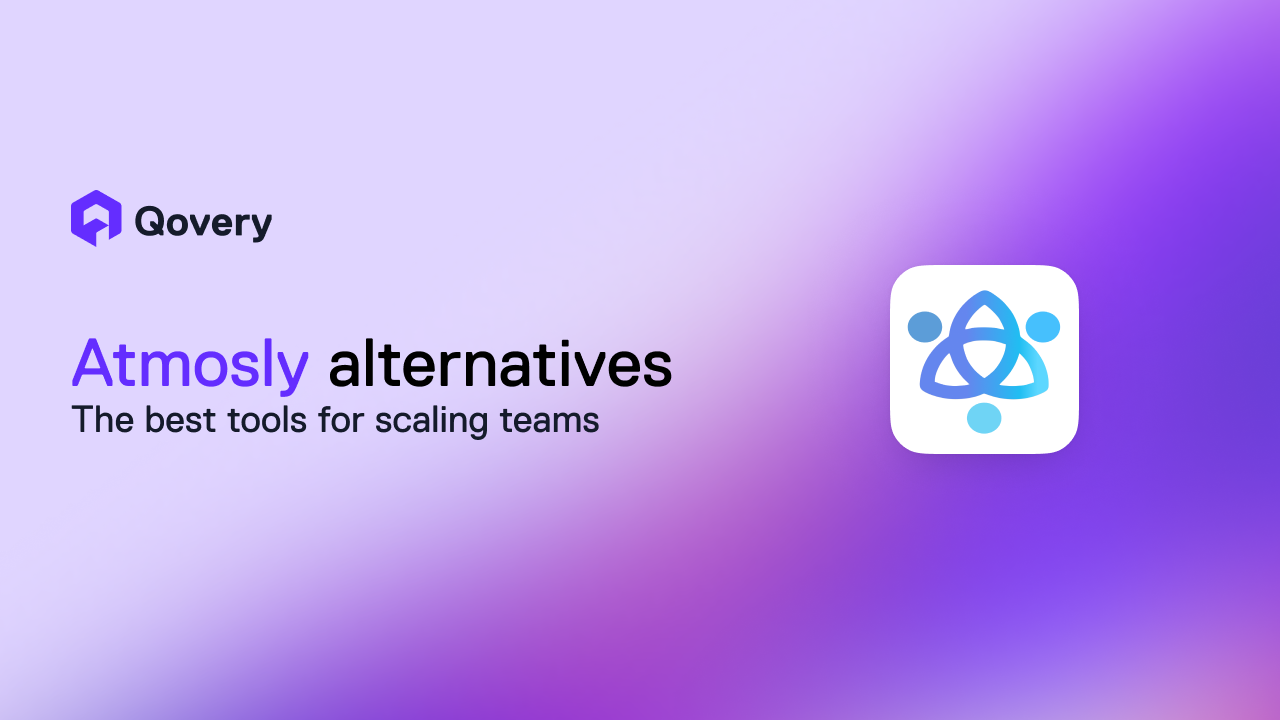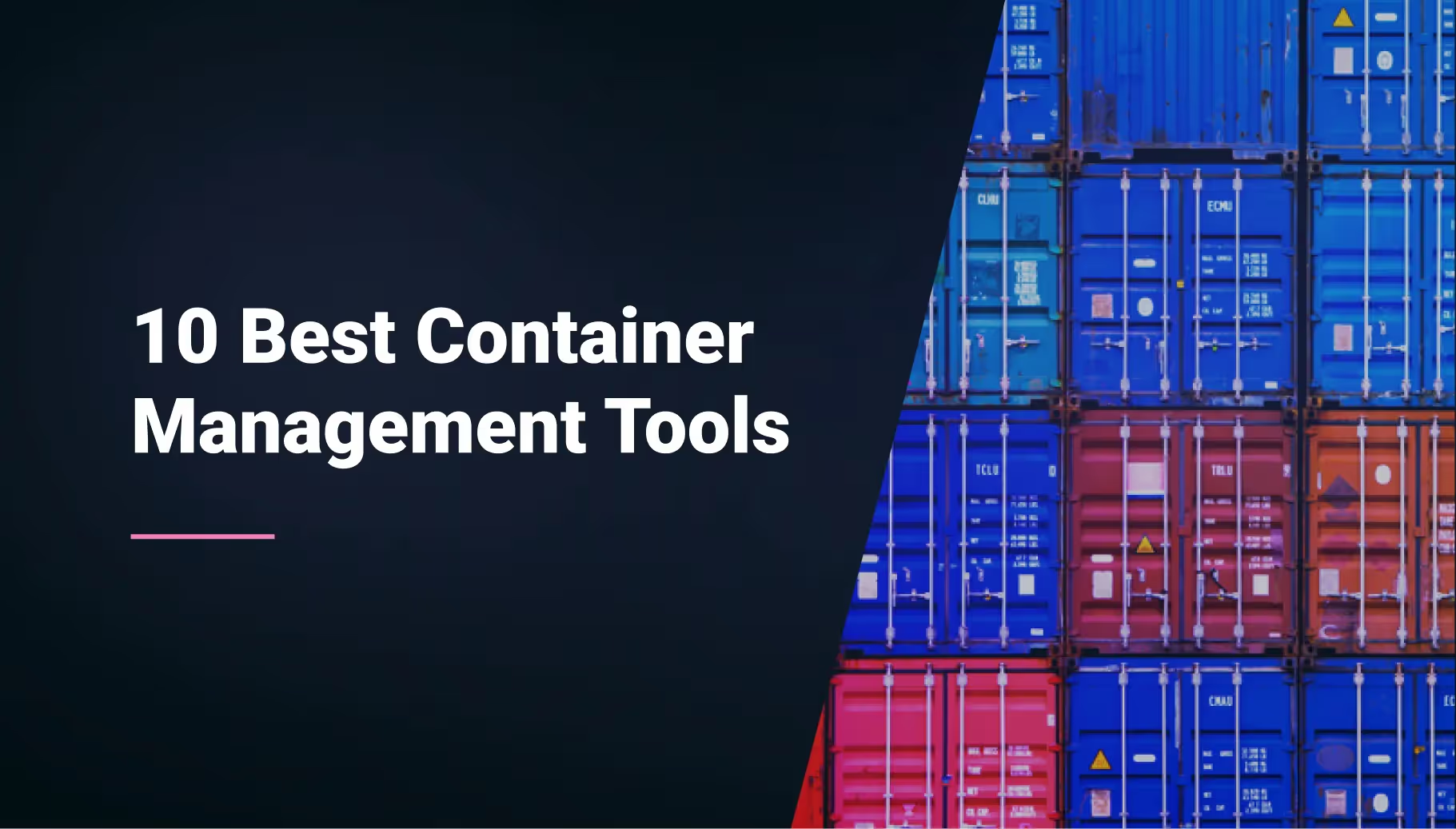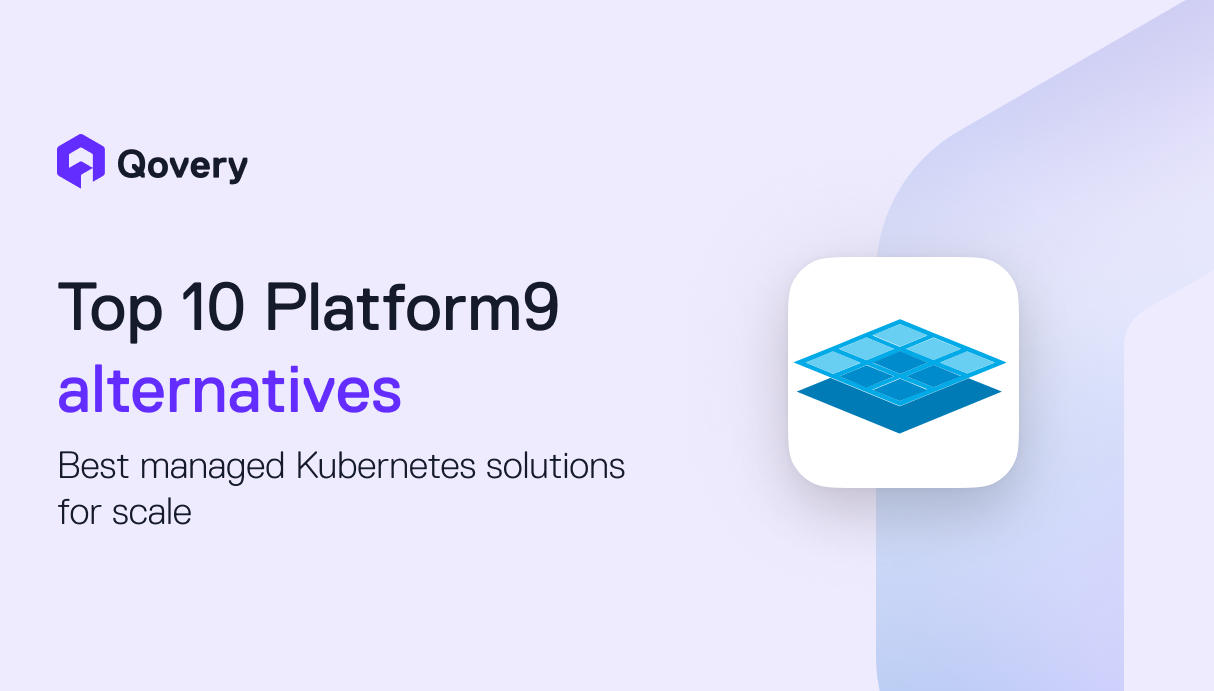
Ephemeral Environments Explained: Benefits, Tools, and How to Get Started?



Key Points
- Ephemeral Environments eliminate the constraints of a shared development environment. They let engineers work independently while providing all the tools and confidence to ensure their work meets expectations.
- Automated environment provisioning for features reduces deployment types and general development lifecycle iterations. Some features require dozens of iterations to get right, and saving time with on-demand environments at each step greatly improves teams' velocity.
- Unlike persistent traditional environments, ephemeral environments are provisioned when needed and automatically deleted when unused. This prevents resource sprawl and brings cloud costs down.
Ever felt the friction of a shared staging environment, waiting in line just to test your latest feature? Or wrestled with "it works on my machine" only to find unexpected issues in production? These are the all-too-common headaches of traditional development setups.
But what if you could instantly spin up a pristine, production-like environment for every single code change, then watch it vanish when you're done? Welcome to the world of Ephemeral Environments, the modern solution that's transforming how teams build, test, and deploy software.
What are Ephemeral Environments?
Ephemeral environments are temporary, isolated, and on-demand computing environments used for deploying an application internally, often using a non-production-ready code to be used for development, testing, and validation.
They usually only exist for a matter of hours and are spawned at the demand of the software engineer or tester (typically within the code review process). They run isolated from any other environments, ensuring that they carry all necessary dependencies with them while not affecting other resources or infrastructure.
The goal for these environments is to mimic production environments as best as possible. They strive to carry the same infrastructure setup, services, and dependencies that a production service would. Moreover, they hold production-like datasets and databases, either anonymized or synthetic, ensuring testing can be performed with similar data to what the application will encounter.
Traditional Environments vs Ephemeral Environments
Traditional development environments often present several challenges:
- Shared Bottlenecks: Code is typically pushed to a shared staging or pre-production environment. This creates bottlenecks when multiple engineers need to use the environment simultaneously, often leading to queues and delays.
- Production Discrepancies: Differences between local development, staging, and production can cause issues. Understanding the unique characteristics of each environment can be complex, potentially leading to deployment failures or application instability in production.
- Manual Configuration & Maintenance Overhead: Non-automated environments often require time-consuming manual configuration changes. This impacts development and testing teams, as they can't work until an environment is live. This also diverts time from application development to infrastructure maintenance.
- Cost Waste: These environments are typically "always-on," leading to resource cloud sprawl and unnecessary costs, as resources are paid for even when not actively in use
Ephemeral environments offer a modern solution to these development and testing challenges:
- On-Demand & Temporary: They are temporary, on-demand environments designed to resolve traditional development bottlenecks.
- Replicable & Accessible: These environments are readily available and replicable for any development effort, used only when needed.
- Production-Like Accuracy: They closely mimic production realities, allowing engineers to test and deploy with confidence that their work will perform as expected in production.
- Eliminates Uncertainty: By providing a consistent and accurate testing ground, ephemeral environments remove the uncertainty associated with traditional environments.
Testing vs. Development Ephemeral Environment
It is important to note that ephemeral environments can be used in various use cases.
The most common is an ephemeral testing environment. It is used for quality assurance and validation, making sure the code change committed to the application is meeting expectations. These environments can also be used for automated CI/CD pipeline, performance, load-testing, or integration testing with external services.
The second is an ephemeral development environment. These are more targeted to developers and used as personal sandboxes to perform feature experimentation and development. While they are usually used for prototyping and proof-of-concept validations, in some cases engineers prefer working in such environments, as they provide immediate production-like feedback on functionality and performance.
Benefits of Ephemeral Environments
1. Accelerated Development Cycles
The main benefit of an ephemeral environment within an engineering organization is the accelerated development cycles. Multiple developers can work on different features simultaneously without any environment conflict. They have instant access to the tools they need to work, no waiting queue for shared resources or manual environment setup.
Environments are provisioned automatically, lessening the risk of configuration mistakes and infrastructure woes. They let engineers validate quicker what they’re working on, letting them iterate and deliver at a faster pace.
2. Early Problem Identification
The environments aim to be as close as possible to production, this leads to problems being identified and resolved before they are finally deployed to customers.
The testing environment provides realistic conditions that should reveal any integration issue. With the addition of automated testing, breaking changes and regression are naturally less likely to be promoted to production.
3. Enhanced Collaboration and Sharing
While being provisioned for one code change only, these environments are accessible by any engineer or stakeholder within the organization, which allows for easy sharing of demos, reviews, or feedback with a simple link.
The availability of as many environments as needed lets all teams work independently in their task, ephemeral environments act as handshakes between frontend, backend, and QA teams.
4. Cost-Effectiveness
Ephemeral Environments are only spawned when required and cleaned up after use, they use the least amount of resource necessary to provide confidence for deployment.
Their short-lived aspect ensures a cost-effective usage for the engineering organization compared to an always-on environment.
5. Consistent and Reproducible Environments
Every ephemeral environment is built from the same template and configuration, they respond to the same definitions as a production one, preventing any manual change or human error along the way.
Their changes are tracked through the code repository where the application is versioned, and any infrastructure change is applied uniformly through Infrastructure-as-Code ensuring repeatability and immutability.
6. Simplified Troubleshooting
Troubleshooting is simplified, as environment isolation prevents it from affecting any others. This creates great conditions for debugging and investigations, confined to a limited set of changes within the environment.
Key Tools & Technologies for Ephemeral Environments
There are many tools that help make ephemeral environments easy to deliver to engineers. The following builds the most common application stack to get started.
1. Application Level: Docker for Packaging
At the application level, tools like Docker take care of the packaging of applications and their dependencies into a portable and consistent object. Containers are built to run identically across any environment, as they embed all application layers down to the operating system.
They are lightweight virtualization-like systems with minimal overhead or performance impact. The centralized image storage and distribution system ensures shareable and reusable resources.
2. Container Orchestration: Kubernetes for Scalable Management
A container orchestration system like Kubernetes allows for management and deployment at the scale of the aforementioned packaged applications. It offers automatic scaling and resource allocation. It also ensures networking and load-balancing capabilities, ensuring service discovery and communication.
Systems like Kubernetes are built on Cloud Providers like AWS or Azure, as they dynamically provision machines usable to run all workloads.
3. CI/CD Systems for Automated Provisioning
Within this framework, CI/CD (Continuous Integration/Deployment) systems natively integrate a developer's work environment with their deployment platform.
This lets systems like Github Actions or Gitlab CI automatically trigger application provisioning through the container orchestration platform, for any environment or code version.
4. Kubernetes Management Solutions: Simplifying Ephemeral Environments
Some Kubernetes management platforms like Qovery simplify the delivery of Ephemeral Environments. Qovery is a comprehensive platform meant to manage and simplify application deployment for engineering organizations.
It is a developer-first interface, eliminating the infrastructure complexities that come with deploying Kubernetes. It is cloud-agnostic and plugs in seamlessly to an existing provider. It offers a strong deployment and environment management system, ensuring code reaches any testing environment and production with confidence.
How to Get Started with Ephemeral Environments in 5 Steps
1. Make Your Applications Portable
The first crucial step is to make your applications portable. Leveraging Docker, you can port your current build and deployment system into a container that runs consistently on any machine.
This involves creating Dockerfiles to clearly define your application's building and deployment procedures. Crucially, you'll also manage dependencies to ensure the application remains truly portable across different environments.
2. Embrace CI/CD
Next, it's time to embrace CI/CD. Continuous Integration significantly benefits from automating most of your development lifecycle tests. When code is pushed to a repository, builds and tests are automatically triggered.
Furthermore, ephemeral environments can be spun up during code commits or pull requests on the repository. Once a pull request is merged into the main branch, the changes are automatically promoted and deployed to production, with the assurance that they've been thoroughly verified and tested along the way.
3. Choose the Right Kubernetes Management platform
It's vital to choose the right Kubernetes management platform for your engineering organization. The focus here should be on ease of use and capabilities. A platform should empower engineers, not become a hurdle. Teams struggling with complex platforms can lose focus on their actual application development as they grapple with deployment processes, ultimately hurting velocity and productivity. Qovery is an example of a solution that operators find easy to set up and maintain, while also offering a great developer experience to its users.
4. Standardize Environments
Once a platform is set up, it's essential to standardize the environments where applications will run. This means ensuring consistent configurations and setups for building the environment's infrastructure and dependencies.
By using technologies like Infrastructure-as-Code (IaC), you can make these environments repeatable, immutable, and versioned. This standardized template then becomes the foundation for creating ephemeral environments.
5. Begin with Ephemeral Environments on Smaller Projects
To begin with ephemeral environments, it's generally better to start with smaller projects. These typically have fewer dependencies and constraints, allowing teams to gradually build their understanding of the configuration needs, management, and usage of these environments.
This measured approach helps teams gain confidence and expertise before ramping up to cover the entire organization.
Qovery: Your Partner in Ephemeral Environments
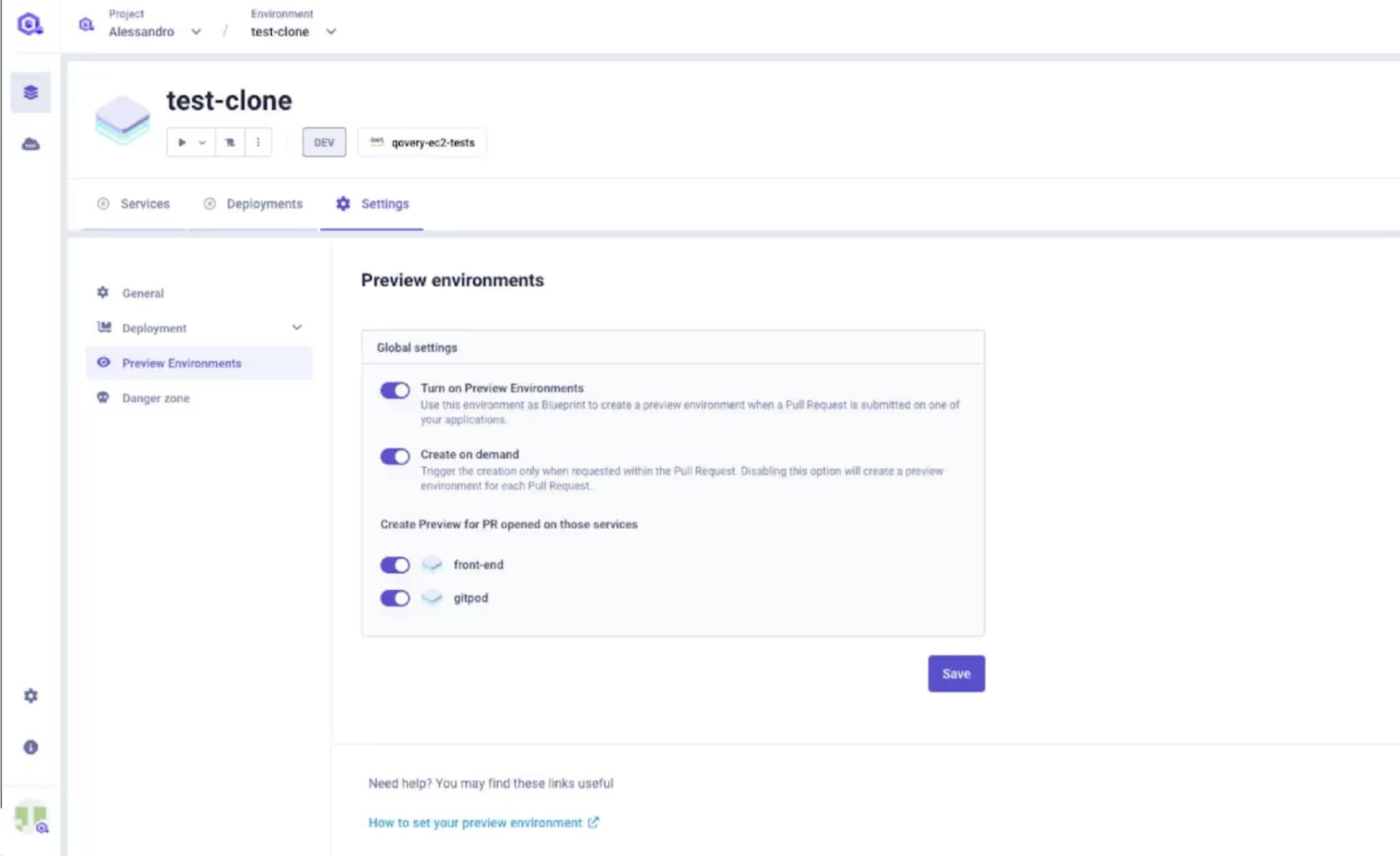
Qovery provides a powerful and flexible Ephemeral Environments system that integrates into any development workflow. Using any compatible Git and CI providers, environments can be provisioned for each pull request to a repository with a simple setup.
Here above is a simple configuration to activate preview environments on an application.
Once activated, when creating a pull-request to the application’s repository, a new ephemeral environment will be provisioned and a comment will appear on the pull-request indicating the environment’s URL, ready for testing. Qovery also integrates with your team’s chat, letting developers know that their environment is ready for use.
Ephemeral environments are provisioned on-demand and automatically decommissioned when not used anymore, keeping your infrastructure costs lean.
“Qovery helped us speed our release cycles and scale our development team with their Preview Environments product" - Nicolas Albani - flat.mx
Ready to improve developer productivity and application quality ? Join thousands of developers using Qovery to deploy ephemeral environments to develop, test and release with confidence. Sign up!
Conclusion
Ephemeral environments solutions, like Qovery, represent a fundamental shift in how we approach software development, testing, and deployment. By eliminating the traditional constraints of a shared environment, teams can achieve a better level of productivity and engineering excellence at a better cost for the organization.
Organizations embracing ephemeral environments gain significant competitive advantage with faster time to market, higher code quality, improved developer satisfaction, and reduced costs. Ephemeral lends itself to fully automated platforms at the service of developers, simply managed and out of the way of the product.
Qovery eliminates the hardships traditionally associated with managing a platform and transforms ephemeral environments from a complex task into a simple, one-click solution. By handling the underlying infrastructure, Qovery empowers development teams to focus on building great software products with confidence. Try Qovery today!

Suggested articles
.webp)



.svg)
.svg)
.svg)
